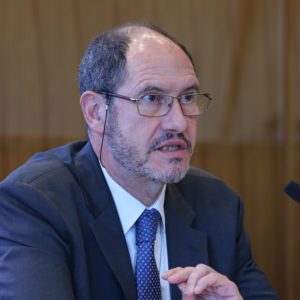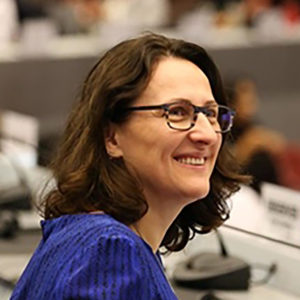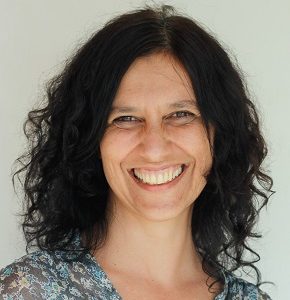Event Virtual
Chemicals and Waste Briefing | Year in Review and Priorities for 2021

This briefing, organized within the framework of the Geneva Environment Network, reviewed the outcomes of the negotiations related to chemicals and waste in 2020, with the constraints of the COVID-19 pandemic and presented the important conferences scheduled in 2021.
About the Briefing
This Chemicals and Waste briefing, organized within the framework of the Geneva Environment Network, reviewed the outcomes of the work and key activities in 2020 to advance the sound chemicals and waste management globally. It also presented the latest information on the important conferences scheduled in 2021.
Next year, the 5th Session of the International Conference on Chemicals Management (ICCM5) and the back-to-back 15th Meeting of the COP to the Basel Convention, the 10th meeting of the COP to the Rotterdam Convention and the 10th Meeting of the COP to the Stockholm Convention (BRS COPs) will convene in July. The 4th Meeting of the Conference of the Parties to the Minamata Convention on Mercury in November.
Note: the above information may be outdated. Please consult our update on international negotiations for the latest news and dates for upcoming major environmental events.
Speakers

Carlos MARTIN-NOVELLA
Deputy Executive Secretary, Basel Rotterdam and Stockholm Conventions

Monika STANKIEWICZ
Executive Secretary, Minamata Convention on Mercury

Monika MACDEVETTE
Head, Chemicals and Health Branch, UNEP

David OGDEN
Chief, Governance Branch, Basel, Rotterdam and Stockholm Conventions

Claudia TEN HAVE
Senior Policy and Coordination Officer, Minamata Convention on Mercury

Cristina ZUCCA
Head, Pollution and Health Unit, Chemicals and Health Branch, UNEP

Nalini SHARMA
SAICM Coordinator

Felix WERTLI
Head of Global Affairs Section, Federal Office for the Environment, Switzerland
Summary
Welcome and Introduction
Carlos MARTIN-NOVELLA, Deputy Executive Secretary, Basel, Rotterdam and Stockholm Conventions
The year 2020 turned out to be an unexpected challenge due to the uncertain times of the pandemic, bearing huge challenges for countries and citizens. In the long term, the pandemic also provides an opportunity to build back better. As consumption resumes, we must look at products and production from a lifecycle perspective to ensure that sustainability is hardwired into the new normal.
Despite the many challenges, the Secretariat has continued to work non-stop to ensure continuity of the programme. Many meetings were converted to an online format, bringing new experiences that we have learnt from. While electronic meetings have their limits, we are thankful that technology has allowed us to keep working and connect with each other. With regards to future meeting, we are undertaking risk assessments with consideration for all factors related to the health and security of delegates.
As 2021 approaches, we look forward working together to ensure the success of all big meetings on the horizon, namely the ICCM5, the COP15 of the Basel Convention, the COP10 of the Rotterdam Convention, COP10 of the Stockholm Convention, and the COP4 of the Minamata Convention. We are also planning celebrations for the 20th anniversary of the Stockholm convention.
Monika STANKIEWICZ, Executive Secretary, Minamata Convention on Mercury
The Secretariat of the Minamata Convention expresses its thanks to its 125 parties, including 8 new parties who have joined this year, for their commitment. The Minamata Convention has reached its 3-year marks and parties are now reaching first milestones, including the phasing out of manufacturing, import and export of listed mercury products. Parties have also undertaken actions to reduce and eliminate the use of mercury and mercury compounds in gold mining, in partnership with the GEF and the Global Mercury Partnership. The third round of the Specific International Programme has also been launched, a part of the Convention’s funding mechanisms to provide capacity building and technical assistance to the parties.
Despite the unprecedented situation of 2020, we have been carrying our obligations and supporting national implementation of the Convention more than ever. We are thankful to the Focal Points in the capitals, the Missions in Geneva and all who have been on the Convention on a daily basis for engaging and keeping the momentum of the young Convention. In this context, being part of the Chemicals and Waste cluster has been extremely helpful, as we learnt from each other and built on each others’ steps. Mutual participation in meetings and dialogues has been very useful to deepen the understanding, exchange and progress on international trade control regime, effectiveness evaluation and environmentally sound management. Thus, we thank the BRS Secretariat, the Chemicals and Health Branch of the UNEP and Switzerland as a hosting country for the excellent collaboration this year.
The Minamata Convention and Global Mercury Partnerships can be described as an example of good international governance, with an global treaty on one hand and voluntary partnerships of stakeholders on the other, both united under the same goal. Next year, the Minamata Convention COP4 will be held from 1 to 5 November 2021 in Bali, and we are looking forward to the good outcomes that will emerge from this major event.
Monika MACDEVETTE, Chief, Chemicals and Health Branch, UN Environment Programme
The year 2020 was like no other, but none of us stopped and we found innovative ways to connect, move the agenda forward, form new partnerships and deliver our mandate. The UNEP continued to deliver to our stakeholders to force a new path to respond to the crises that humanity and the planet is facing. UNEP’s medium-term strategy has recognized the central challenges of climate change, biodiversity loss and pollution. In particular, the work of the UNEP on chemicals, waste and health has kept pace with the challenges we face, thanks to the commitment of member states, the generosity of our donors, the mutual support of the BRS and Minamata Secretariat, and the engagement of stakeholders.
Some of the work of the Chemicals and Waste Branch may not have received as much attention as chemicals in 2020, but nonetheless constitute an essential part of our work. For example, the UNEP strengthened its air quality management capacities and launched a new global electric mobility program to support a shift to cleaner and healthy mass mobility. The UNEA mandate toward a pollution-free planet is now firmly embedded in the new mid-term strategy and UNEP’s programme of work. Our partnership with the International Environmental Technology Centre in Osaka produced a report on waste management during the pandemic (From Response to Recovery), highlighting response plans and long-term solutions to build back better. Our knowledge and risk team produced five flagships reports in response to UNEA mandates this year.
With the postponement of ICCM5 to 2021, the ICCM5 Bureau established a virtual process with all stakeholders in order to keep momentum and to prepare for the negotiations next year. SAICM stakeholders have been actively engaging in the meetings and providing written submissions. The Special Programme on institutional strengthening to support countries in the sound management of chemicals and waste is now in round 4 of the proposals which are being evaluated.
The year 2020 was supposed to be a year for nature. But in order for nature to do its part in combatting climate change, we need to make sure that nature functions to its full capacity in a clean and healthy environment for all. We cannot continue to take from the land and the oceans and give nothing back but pollution, and expect those systems to function properly.
Basel, Rotterdam and Stockholm Conventions
David OGDEN, Chief, Governance Branch, Basel, Rotterdam and Stockholm Conventions
The pandemic situation has changed the way we worked but it has not slowed us down. The Basel Convention’s open-ended working groups were held in two separate segments, allowing for more extensive work to be covered. The first session was held online in September this year and a second face-to-face session is to be held next year. The online format allowed for more participation, with around 600 participants for 120 countries attending. The main outcome was to ensure that the intersessional work continued to the next meeting and to the COP.
The Implementation and Compliance Committee also met online this year in three sessions. As the main outcome, compliance issues with a number of parties have been discussed and some resolved. General issues dealing with reporting, national legislation, illegal traffic, control system, and guidance on transboundary movements were discussed to improve implementation of the Basel Convention. The Basel Convention has also been working in the area of focusing on eight dimensions: amendments on plastic waste (which will become effective on 1st January 2021), technical guidelines, review of annexes, Plastic Waste Partnership, Custom codes, Inventory, effectiveness assessment and technical assistance. Overall, the aim is to work with partner countries to improve their management of plastic waste.
Recent development within the Basel Convention has seen proposal to amend the convention with regards to e-waste. As a result of entries proposed by the EU, Ghana and Switzerland, all e-waste moved transboundary, be it characterized as hazardous or not, will be subject to the prior form consent procedure. The ultimate goal of these amendments is that the final disposal of e-waste can be done with state-of-the-art technologies and contribute to a circular economy. The Russian Federation has also proposed amendments regarding deadlines. These proposals will be submitted to all parties on 19 January 2021.
The Rotterdam Convention held an online meeting in September 2020, which looked at recommended listing of two chemicals in particular (perfluorooctanoic acid and decabromodiphenyl ether). The proposed amendment has been circulated to parties on 15 December 2020 and will be considered at COP10, for which the invitation will be sent out by 17 March 201. Additionally, the Rotterdam Convention has been holding webinars and its new compliance mechanism has entered into force in November 2020.
For the Stockholm Convention, the POPs Review Committee will meet online in January (provisional agenda available in the presentation slides). A submission to parties about PFHxS has been circulated to parties on 15 December and will be considered at the COP10. Additionally, the Stockholm Convention has followed up on its scientific processes, and continues to deal with emerging issues, for example with the entry into force of new amendments on dicofol and PFOA on December 3.
The meeting of the COP for the three Conventions will be held simultaneously over two weeks (19-30 July 2021) on the theme of “Global Agreements for a Healthy Planet: Sound Management of chemicals and waste”. In terms of preparations, we are looking at potential contingencies and organizational matters in case face-to-face meetings are not possible. The final decision is to be taken by February. Finally, preparations for regional meetings are ongoing: these will be held jointly with the ICCM-5 regionals.
Minamata Convention on Mercury
Claudia TEN HAVE, Senior Policy and Coordination Officer, Minamata Convention on Mercury
After concluding the Minamata Convention COP3 with 13 decisions in 2019, the Secretariat has been working toward COP4. The year 2020 has seen considerable development with regards to the preparations of COP4, expert groups, effectiveness evaluation, the Specific International Programme and the Minamata Online webinars and informational sessions. Additionally, the Secretariat has been building step-by-step its Capacity-building and Technical Assistance Programme which focused on the 2020 products deadline, mercury trade and emissions, as well as general provisions and ratifications by new parties.
Moving toward 2021, continuing with the COP4 preparations is the most important priority to help parties and stakeholders to be ready for November 2021, while keeping the COVID context under close review. The current plan is that we would be able to meet face-to-face in Bali, although final decisions will be taken during the course of the year. The Secretariat will also focus its effort on continuous intersessional work, the meeting of the Implementation and Compliance Committee, financial mechanism (GEF and Specific International Programme), the second season of Minamata Online and joint studies with the BRS.
While working in an online format has not been idea, the work has not been interrupted nor delayed. Intersessional work for COP4 and technical expert group have addressed products and processes, releases and mercury waste. Intersessional work on effectiveness evaluation has been conducted regarding indicated, monitoring guidance and reports on trade and supply. Those who wish to stay updated can follow the online working space. Additionally, the Secretariat has undertaken to develop a gender roadmap to mainstream this issue within its programme of work.
To support parties and stakeholders, the Secretariat has launched the Minamata Online, which will resume with a resume with a second season in 2021. Within its Capacity-building and Technical Assistance Programme, the Secretariat assisted parties for the 202 deadline and worked on mercury trade and emissions with the Global Mercury Partnership. In this work, the Secretariat thanks the support of the European Union, UNITAR, Switzerland, and many experts. Meanwhile, the Specific International Programme provided support for 15 projects in 2020 and welcomes now applications for the third round until 18 March 2021.
Following the decision 3/11 of our most recent COP, the Secretariat has enhanced cooperation with the Secretariat of the Basel, Rotterdam and Stockholm Conventions. With the UNEP Chemical and Waste Branch, the joint task force works on enhancing programmatic cooperation and exploring interlinkages with broader agendas. A new area of work has started from this collaboration with the joint studies on climate change and biodiversity.
Regarding national reporting under Minamata, we are happy to announce that almost 80% of parties have submitted. The Secretariat is actively supporting parties for the full reporting of next year. The Implementation and Compliance Committee will meet in the first half of next year to review these reports. Moreover, 91% of the focal points with parties have been put in place. We look forward to meet all of parties and stakeholders at the COP4 in November, hopefully in person.
UNEP Chemicals and Health Branch
Cristina ZUCCA, Head, Pollution and Health Unit, Chemicals and Health Branch, UN Environment Programme
The year 2020 has been very challenging, however, we have been able to deliver a lot. Even if COVID-19 has created a challenge, it has also given us an opportunity to rethink the relation between health and environment, which is a strong focus of our branch. 2020 has also been the year of strategic thinking as we formed our new mid-term strategy for 2022-25, which will be submitted to UNEA-5 for approval. This new strategy focuses on three interlinked planetary crises: climate change, biodiversity loss and pollution.
The Chemicals and Pollution subprogramme aims at making significant progress towards a pollution-free planet with three significant outcomes: enhanced capacity and leadership on the sound management of chemicals and waste, improved waste management, and reduced release of pollutants. This is in line with UNEP mandates stemming from close to 30 resolutions adopted in by the previous UNEA. While the Chemicals and Health Branch focuses on chemicals, waste and health, it also works in close collaboration with other UN institutions to link the issue with other environmental agendas.
Regarding enhance capacity and leadership, the Branch focuses on sound science, knowledge and information, joint programming with BRS and Minamata, MESs implementation support, and enhanced cooperation at the nexus of environment and health. The Branch’s work on improved waste management addresses strengthen the 3Rs, promoting sustainable waste strategies and actions, strengthening capacities to manage specific waste streams, and close open dumpsites in collaboration with UN-HABITAT and other partners. Finally, the Branch aims at reduced releases of pollutants by working on tracking the global status of pollution and policy actions, promoting knowledge exchange and capacities particularly on air pollution, promoting electric mobility, enhancing horizontal capacities through public advocacy, support GEF projects on MEA-regulated pollutants, and coordinating action through Global Alliances.
The Branch sees a key opportunity in having an ambitious outcome for beyond 2020 to help us transition to a pollution-free planet. Interlinkages with other processes, such as efforts of climate and biodiversity, are also important for moving forward. Gender, health and social consideration remain an important aspect in addressing chemicals and waste issues. The Branch also recognizes the need for a multi-stakeholder, multisector and multidisciplinary approach, as well as interagency collaboration and coordinated action. To conclude, we need to leverage more UN reform, partnerships and funds to address capacity gaps of countries, including addressing these as part of COVID-19 recovery efforts. Addressing pollution, chemicals and waste is a very strong contribution to SDGs.
Strategic Approach to International Chemicals Management (SAICM)
Nalini SHARMA, SAICM Coordinator
Both the ICCM5 scheduled to take place in October 2020, and the IP4 were postponed. In the meantime, the Bureau has agreed to establish Virtual Working Groups (VWG), whose purpose is to develop proposals for tangible outcomes. The outcomes will be presented in meeting documents and discusses at IP4. The VWGs are not intended to replace face-to-face discussions, but should advance our work ahead of the negotiations by working on specific, concrete and rather technical issues.
Several VGWs have been established working specifically on (1) targets, indicators and milestones, (2) governance and mechanisms to support implementation, (3) issues of concern, and (4) financial considerations. The recording of the sessions and additional documents are available. Regarding registration, more women than men have joined the meeting and regional distribution indicates around 60% of participants from the EU. Although eectronic feedback from other regions has been received, the SAICM hopes to find some other means to engage better with these regions.
A number of technical briefings are being held through 2020 and 2021. Regarding the timeline, the VWG will continue to run until the third week of January, with the active engagement of participants through meetings and electronic feedback. Additionally, a process for high-level decision has started with the establishment of an informal drafting group in October 2020 and an open call for submissions for inputs. The draft structure will be submitted next week and receive electronic feedback until 15 January.
The face-to-face meeting of IP4, scheduled for March 2021, has been postponed. Discussed are held at the Bureau level in terms of how to proceed, with possibility to have several segments. As for the ICCM5, it is scheduled for 5-9 July 2021 in Bonn, Germany.
Closing Remarks
Felix WERTLI, Head of Global Affairs Section, Federal Office for the Environment, Switzerland
While we have all been touched by the corona crisis, we would like to thank you all for the great work over the year. Throughout the year, we have learnt about the limits of online tools, but also their potential for the future. We are also thankful for the leadership of the Conventions and the UNEP and their ability to protect their staff members during the pandemic.
The upcoming year will see an impressive number of major events in the Chemicals and Waste cluster, as well as the UNEP new strategy which emphases pollution as well. This is an opportunity to create visibility for the Chemicals and Waste cluster, and to show the impact of our multi-stakeholder process which makes significant steps toward an environmentally sound management of chemicals and waste. It will be a strong signal when we are able to work jointly and convey this message.
With all these events, we have to be careful not to overload the agenda. As we need to gain political support for this agenda, the four high-level segments should be planned carefully so as to not compete with each other. We should focus on the inventive ways to have high-level events but organize them so as to gather political momentum and support without proliferating. As member states, it is important that we can attend all of them. Thus, the Joint Task Force should coordinate to avoid overlap and overload, even more considering the difficulties to travel in the COVID context.
In light of the previous presentations, it is clear that UNEP has now an overarching strategy, in which chemicals and waste plays an important part. For the next year, it will be important to look at linkages among our different agendas and events. We will hopefully be able to create this universal framework, to which all actors of the Chemicals and Waste cluster will be able to contribute.
Finally, the issue of science-policy interface is a strong link within the cluster. Although much research is done with regards to chemicals and waste, we lack a tool on the global level that allows more focused communication between policy and science. While some tools exist, like the Global Chemicals Outlook, they have limitations. Compared to other reports, for instance IPCC, the visibility is much lower, so we do not have the political impact that we would need. This topic should be further discussed next year, as it concerned many actors in the Chemicals and Waste cluster. The report of the UNEP on this subject suggest the option of Assigned Policy Platforms, which have specific mandates and tasks and could undertake horizontal scanning and specific assessment while increasing visibility and awareness. ICCM5 will be a first important step to discuss the needs of our cluster toward such science-policy panels and further interactions.
Finally, GEN has adapted very fast to this COVID context. As we see this fast learning curve and the positive experience of being able to work together in this new context, we would like to thank the GEN team and the UNEP Europe team and we can only hope to keep up and use these efforts in the post-COVID times.
Video
In addition to the live WebEx and Facebook transmissions, the video is available on this webpage.
